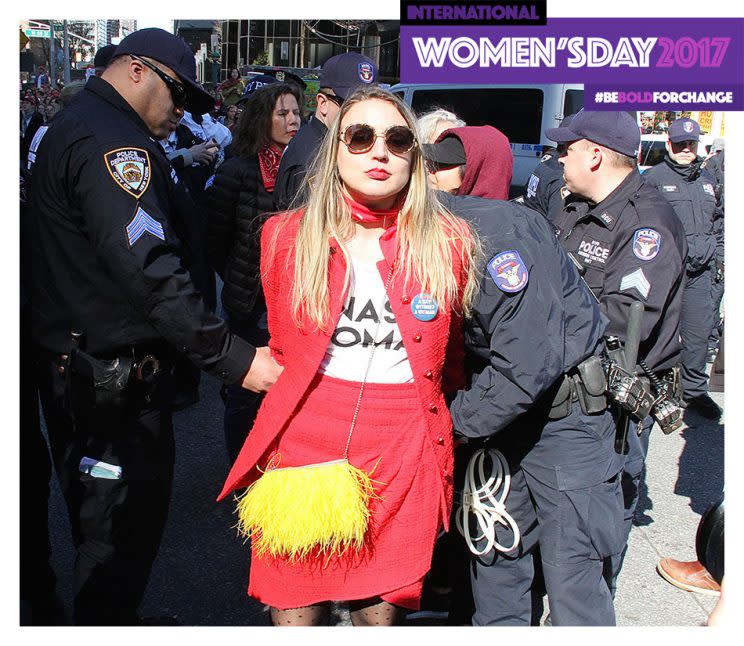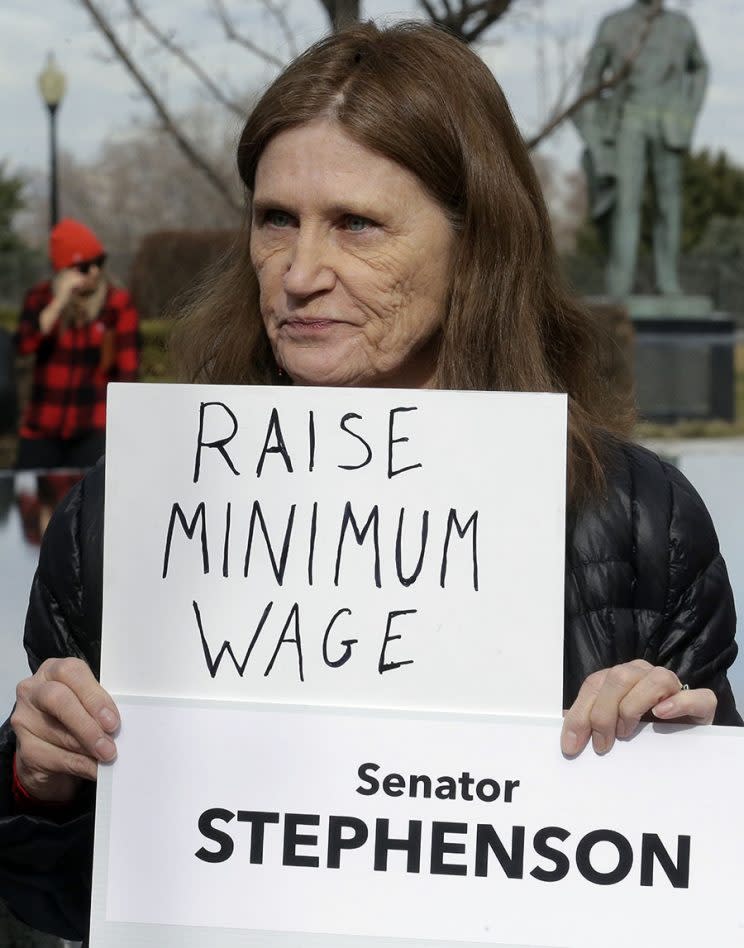Is ‘A Day Without a Woman’ a Day of Privilege?

There’s a buzzword flying around the Internet in response to Wednesday’s “A Day Without a Woman”: privilege. As in, check it, because not all women are able to join the International Women’s Day call to action from the Women’s March organizers — to strike “from paid and unpaid labor” — without consequence.
But is such finger-pointing fair?
First, a little herstory: International Women’s Day originated in the early 1900s, as a response to women demanding voting rights and equal pay (sound familiar?) in the workforce, and its importance soon intensified after the tragic Triangle Shirtwaist Fire in New York City in 1911 killed 140 working women.
By 1975, the day was being observed by the United Nations, which soon adopted a formal resolution regarding International Women’s Day — and in recent years, after decades of declining popularity, the day has been reinvigorated. Because, as the organizers of the day remind us, “The unfortunate fact is that women are still not paid equally to that of their male counterparts, women still are not present in equal numbers in business or politics, and globally women’s education, health and the violence against them is worse than that of men.”

Enter 2017, and the organizers of the highly successful (by most accounts) Women’s March, in January, which spurred sister protests around the globe. Not all women were on board — those with more conservative social values, particularly women who oppose abortion and LGBT rights, found the marches divisive — and now, this fourth of 10 follow-up calls for action is seeing a similar level of infighting. But this time it’s around the issue of just who is and who isn’t “privileged” enough to take part in the day.
IMO Women’s Strike is steeped in privilege, but in honor of #InternationalWomensDay am working from home and not. running. any. meetings.
— Heidi S. Burkhardt (@heidi_sb) March 8, 2017
Women’s strike more like mass demonstration of privilege.
— Laura Erck (@happyapplecider) February 7, 2017
I’m seeing calls for a “women’s strike” floating around again. We need to talk about the privilege issue here.
— crazy grad mama (@crazygradmama) January 12, 2017
Social media is not the only place where this discussion has been playing out.
“The idea behind the strike is a noble one,” noted a story on Quartz. “Who doesn’t want economic equality for everyone? But in practice, most American women cannot afford to opt out of either paid or unpaid labor. This fact, coupled with the very broad aims of the strike, is concerning.”
A Los Angeles Times piece opined, “I highly doubt that ‘anyone, anywhere’ can or will join this party. That’s because it’s really going to be A Day Without a Privileged Woman.” It went on: “Make no mistake, March 8 will mostly be a day without women who can afford to skip work, shuffle childcare and household duties to someone else, and shop at stores that are likely to open at 10 and close at 5.”

Elle also took this tack, with a story entitled “Go Ahead and Strike, But Know That Many of Your Sisters Can’t.” It noted, “Women’s strikes have typically succeeded when they have some clear idea of what women’s work is, some obvious problem that will become clear through women’s strategic withdrawal — for example, a French strike in which women left work early (to symbolize the time of day they stopped getting paid, as compared to men with the same job). Without a specific, labor-related point, after all, a ‘strike’ is just a particularly righteous personal day.”
But The New Yorker calls that sort of criticism, among “liberal-leaning women writers,” an “oddly defeatist assumption that a strike can only perpetuate the conditions that it explicitly seeks to draw attention to and combat.”
Further, while admitting that the entire day and the issues it raises highlights a rather “messy space,” the story points out this nugget: “There’s an underlying note of guilt and aversion in these arguments—a sense that privilege renders a person politically ineffective. In reality, though, as the Women’s March demonstrated, privileged women are uniquely positioned to use their surfeit of cultural leverage to clear space for the causes of everyone else. And that seems to be the fundamental idea of the Women’s Strike: that it could help to forge solidarity between women with favorable working conditions and women who have no such thing.”

As for the organizers of the “Day Without a Woman,” they have not kept silent about the criticism — which they’ve dubbed “concern trolling” — but have instead offered thoughtful, powerful responses.
“The women that are most vulnerable to this economy have been engaged in strikes or other forms of labor struggles all year long, whether that’s being involved in the prison strike, organizing their workplaces, or working with the Fight for Fifteen,” strike spokesperson Sarah Leonard told the New York Times — which noted in its opinion piece that local labor unions, legal and immigrant organizations, and the Yemeni bodega strikers have all endorsed and planned to participate in the strike.
Writing in the Nation in February, strike organizers Magally Miranda Alcazar and Kate Griffiths responded directly to the Elle piece by pointing out the many strikes that have already been happening — from women-led actions at Standing Rock and the recent Day Without Immigrants, to localized union actions in New York City. “Given that so many women with so much to lose from striking are already doing so, perhaps instead of asking what it ‘means’ for women to strike, we should ask, ‘How can we make it possible for more women to strike or keep striking?’” the women ask.
In a follow-up March 7 piece, “When Did Solidarity Among Working Women Become a Privilege?,” strike organizers write, “The issue of whether working-class women, immigrant women, and women of color can participate in March 8 is a very important question and worth paying attention to.” They point out that striking is not the sole way of participating, and highlight that the effort is a grassroots one.
“The NYC rally will not feature any celebrities. It is going to be the rally of the oppressed, of the exploited, of the poor, but also the rally of small victories against capitalism, exploitation, and oppression due to the hard work, activism, and courage of women (cis and trans, of course),” they write. “Immigrant, black, cis, and trans working-class women, mothers of those killed by state and police violence, and sex workers will be on the stage: the women you don’t usually see in the media and featured at big events, but who make our life on this planet possible through their work. Are these the women whom [critics] wish to call ‘privileged’?”
They stress coming together rather than infighting, being open to the typical partisan solutions, and add, “The absurdity is so apparent that the heart of the matter must lie elsewhere.”
What are your thoughts on “A Day Without a Woman”? Tell us in the comments section below.
Read more from Yahoo Beauty:
Only 1 in 3 Women Identify as a Feminist — Despite ‘Feminist’ Beliefs
‘Women’s Strike’ Will Boycott Makeup, Cooking, and Fake Smiles
Let’s keep in touch! Follow Yahoo Beauty on Facebook, Twitter, Instagram, and Pinterest.


